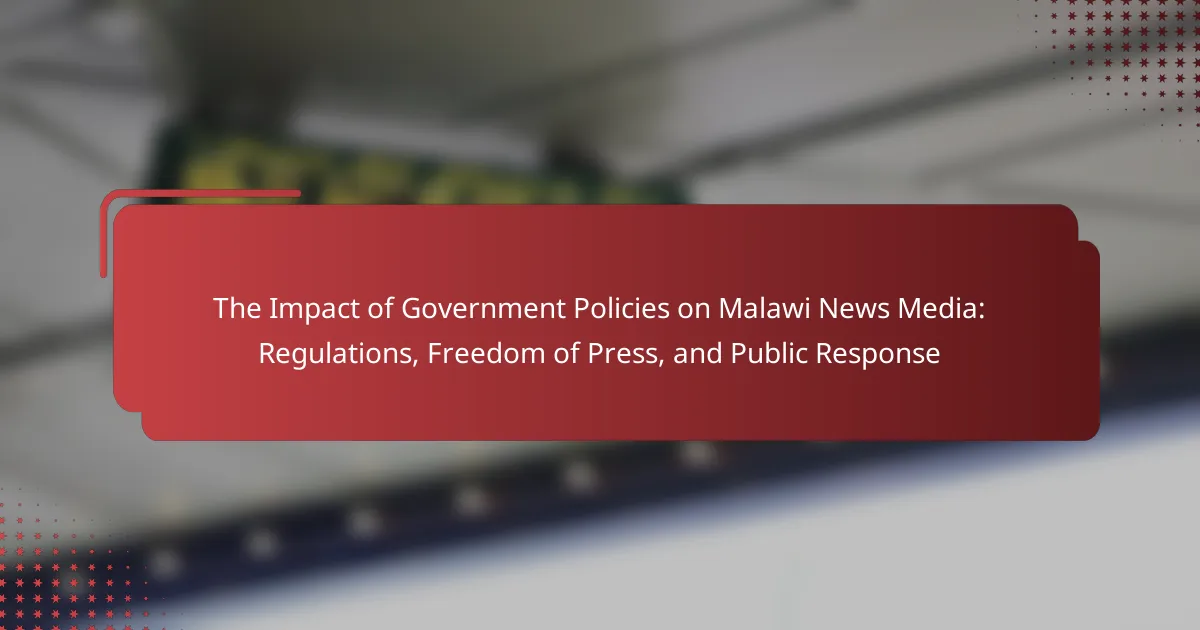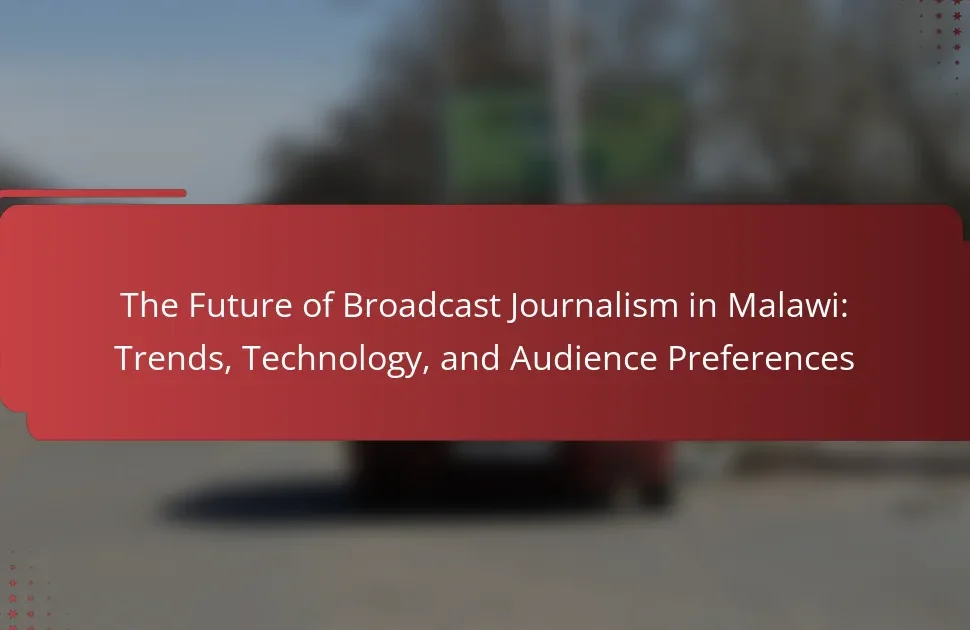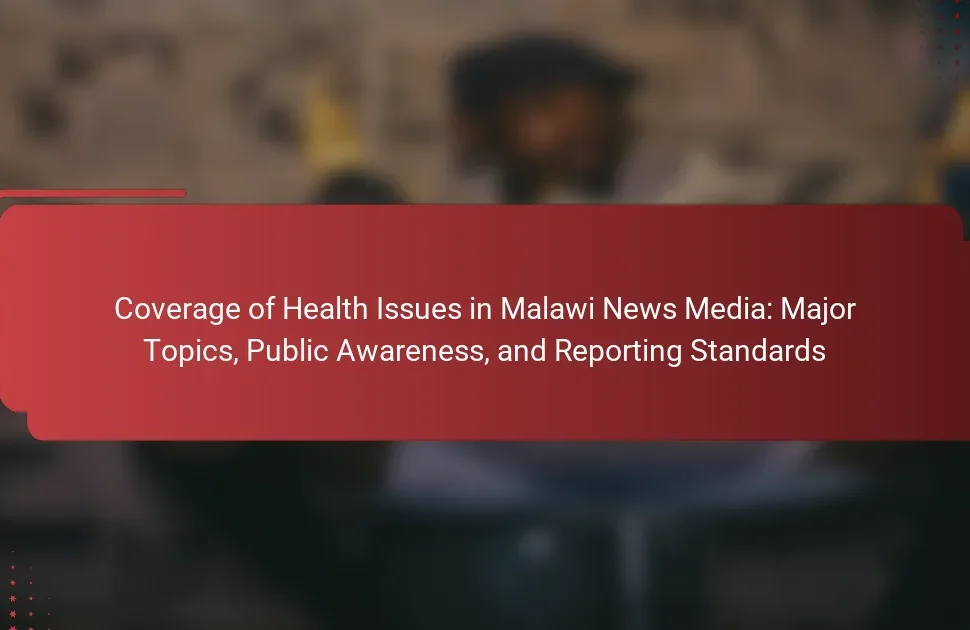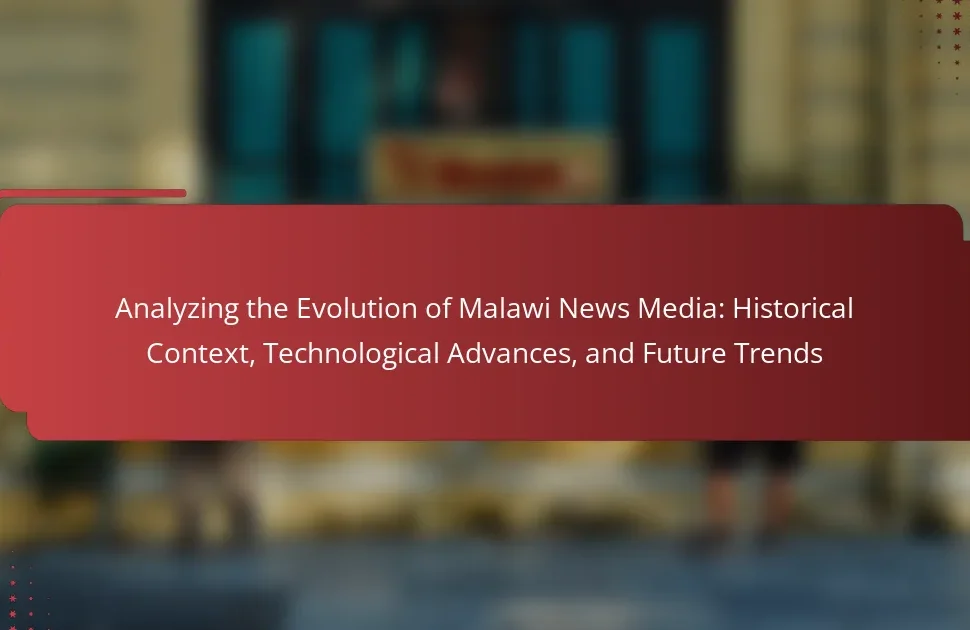The article examines the impact of key government policies on the news media in Malawi, focusing on the Access to Information Act, the Communications Act, and the Media and Communications Policy. These regulations shape media freedom, content regulation, and access to information, with the Malawi Communications Regulatory Authority responsible for compliance. The influence of international standards on Malawi’s media laws is highlighted, emphasizing alignment with principles of freedom of expression and press rights. The article also discusses the evolving media landscape, driven by increased digital access and public demand for transparency, while acknowledging ongoing challenges such as regulatory constraints and political pressures. Overall, it presents a cautious yet optimistic outlook for the future of news media in Malawi.
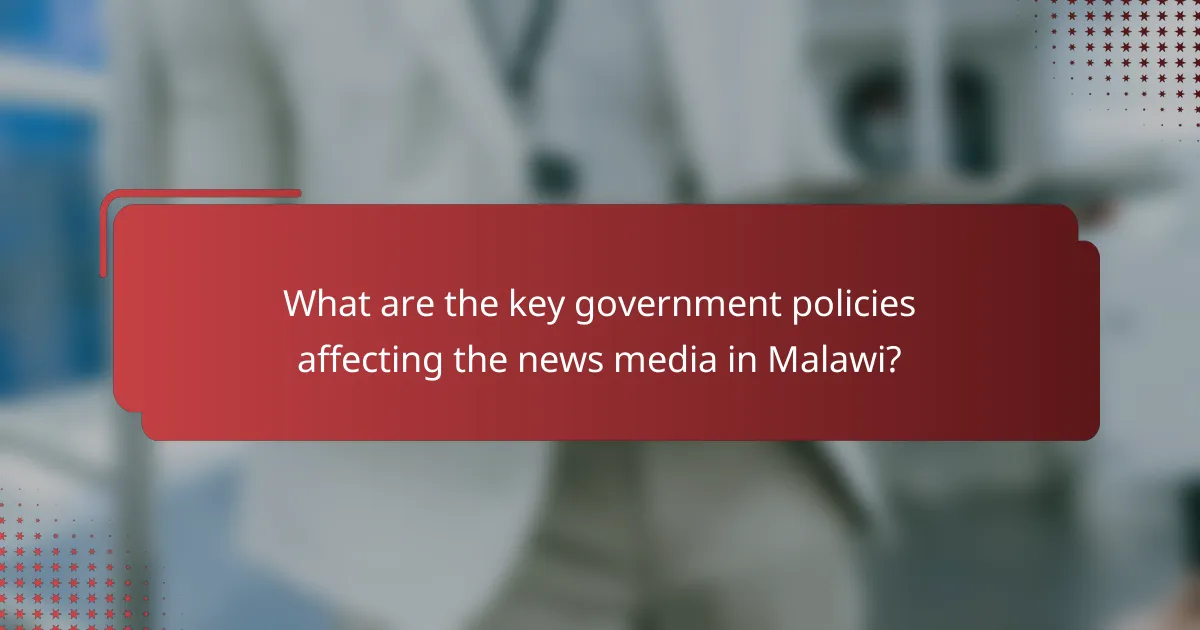
What are the key government policies affecting the news media in Malawi?
Key government policies affecting the news media in Malawi include the Access to Information Act, the Communications Act, and the Media and Communications Policy. The Access to Information Act, enacted in 2016, aims to promote transparency and accountability in government operations. The Communications Act regulates broadcasting and telecommunications, establishing standards for media operations. The Media and Communications Policy outlines the government’s vision for a free and responsible media landscape. These policies influence media freedom, content regulation, and access to information. The Malawi Communications Regulatory Authority oversees compliance with these regulations.
How do these policies shape the landscape of journalism in the country?
Government policies significantly shape the landscape of journalism in Malawi. They establish regulatory frameworks that dictate how media operates. Policies can either promote press freedom or impose restrictions. For instance, the Access to Information Law enhances transparency and accountability. This law allows journalists to obtain information from public bodies, fostering investigative journalism. Conversely, restrictive policies can lead to censorship and self-censorship among journalists. The Media Council of Malawi enforces ethical standards, influencing journalistic practices. Additionally, government funding for certain media outlets can create biases in reporting. Overall, these policies directly affect the diversity and quality of news coverage in the country.
What specific regulations have been implemented by the government?
The government of Malawi has implemented several specific regulations affecting the news media. These regulations include the Access to Information Act, which mandates transparency in government operations. The Media and Communications Act regulates broadcasting and establishes licensing requirements for media outlets. The Penal Code includes provisions that criminalize defamation and false publication, impacting journalistic practices. Additionally, the government has enforced registration requirements for journalists and media organizations. These regulations aim to control media operations and influence the freedom of the press in Malawi.
How do these regulations impact media operations and reporting?
Regulations significantly impact media operations and reporting in Malawi. They shape the framework within which journalists operate. Strict laws can restrict freedom of expression and limit the scope of reporting. For example, the Access to Information Act aims to promote transparency but may also impose burdens on media entities. Furthermore, licensing requirements can create barriers for new media outlets. Compliance with these regulations often leads to self-censorship among journalists. The government’s control over broadcasting licenses can influence the diversity of viewpoints presented. Overall, regulations can create a challenging environment for media freedom and independent reporting.
What is the current state of press freedom in Malawi?
The current state of press freedom in Malawi is restricted. The government enforces laws that limit journalistic expression. Journalists face harassment and intimidation for reporting critically on government actions. In recent years, several journalists have been arrested under the guise of maintaining public order. Reports indicate that media outlets often practice self-censorship due to fear of repercussions. International organizations have highlighted concerns regarding the shrinking space for free speech in Malawi. The 2021 World Press Freedom Index ranked Malawi 75th out of 180 countries, indicating ongoing challenges. Overall, the environment for press freedom remains precarious, with ongoing threats to independent journalism.
How is press freedom measured and assessed in the context of Malawi?
Press freedom in Malawi is measured through various indicators, including legal frameworks, media ownership, and journalistic practices. Organizations such as Reporters Without Borders and the Committee to Protect Journalists assess these factors annually. They evaluate laws that protect or restrict media operations. The presence of independent media outlets also plays a crucial role. Additionally, public access to information and the ability to report without fear of reprisal are significant metrics. Malawi’s ranking on global press freedom indexes reflects these assessments. For instance, Malawi has faced challenges with laws that limit press freedom, impacting its overall score.
What challenges do journalists face in exercising their freedom of press?
Journalists in Malawi face several challenges in exercising their freedom of press. Government regulations often impose restrictions on reporting. Journalists may encounter censorship, limiting their ability to cover sensitive topics. Legal threats and harassment from authorities create a hostile environment for reporting. Additionally, economic pressures can hinder independent journalism. Limited access to information affects the quality of reporting. The risk of violence against journalists is a significant concern. These challenges collectively impact the ability of journalists to operate freely and effectively.
What role does public response play in the context of government policies on media?
Public response significantly influences government policies on media. Citizens express their opinions through protests, social media, and public forums. This feedback can lead to policy adjustments or reforms. For instance, in Malawi, public outcry against media censorship has prompted government reviews of existing regulations. Historical events demonstrate that strong public opposition can result in the repeal of restrictive laws. Public sentiment often shapes the government’s approach to media freedom. Monitoring public response helps authorities gauge societal attitudes towards media issues. Thus, public engagement is crucial in shaping media policies and ensuring accountability.
How do citizens perceive government regulations on news media?
Citizens in Malawi generally perceive government regulations on news media as restrictive and limiting. Many believe these regulations hinder press freedom and reduce the diversity of viewpoints. A survey conducted by the Media Institute of Southern Africa revealed that 70% of respondents feel that government controls stifle journalistic independence. Additionally, citizens express concerns about censorship and the potential for government abuse of power. Many argue that such regulations prevent the media from holding the government accountable. This perception is rooted in historical instances of media suppression in Malawi, which have led to distrust in government intentions. Overall, the sentiment is that regulations should promote transparency rather than restrict it.
What actions do the public take to respond to media restrictions?
The public responds to media restrictions through protests, petitions, and social media campaigns. Protests have been organized to voice opposition against censorship and demand press freedom. Petitions are circulated to gather support for media rights and challenge restrictive laws. Social media serves as a platform for raising awareness and mobilizing community action. Additionally, citizens engage in discussions and share information to circumvent restrictions. These actions reflect a collective effort to uphold freedom of expression and challenge government policies. Historical instances in Malawi show public mobilization against media censorship, highlighting the importance of civic engagement in advocating for press freedom.
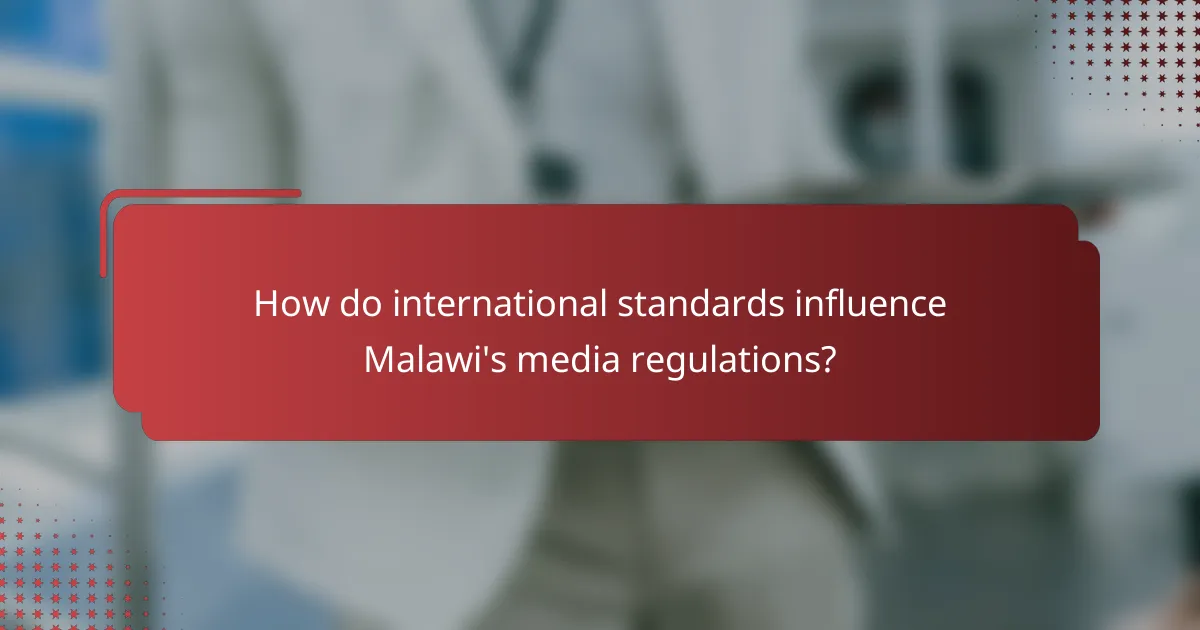
How do international standards influence Malawi’s media regulations?
International standards significantly influence Malawi’s media regulations by providing frameworks for freedom of expression and press rights. These standards, established by organizations like the United Nations and the African Union, set benchmarks for democratic governance. Malawi’s media laws often align with these international norms to promote accountability and transparency. For instance, the African Charter on Human and Peoples’ Rights emphasizes the right to information. Consequently, Malawi’s regulations reflect these principles to enhance media freedom. Additionally, international pressure can lead to reforms in local legislation. This alignment helps Malawi improve its global standing in human rights and media freedom assessments.
What international agreements has Malawi signed regarding press freedom?
Malawi has signed several international agreements regarding press freedom. These include the African Charter on Human and Peoples’ Rights. This charter emphasizes the importance of freedom of expression. Malawi is also a party to the International Covenant on Civil and Political Rights. This covenant protects the right to freedom of expression and information. Additionally, Malawi is a member of the Commonwealth and adheres to its principles, which promote media freedom. These agreements reflect Malawi’s commitment to uphold press freedom in accordance with international standards.
How do these agreements affect local media policies?
These agreements influence local media policies by establishing guidelines for content regulation and media ownership. They often promote transparency and accountability in media operations. Agreements can also dictate the extent of press freedom and the protection of journalists. For instance, specific clauses may restrict censorship or enhance the rights of media entities. These changes can lead to a more diverse media landscape. They may also encourage local media to adhere to ethical standards. Overall, such agreements shape the regulatory framework that governs media practices.
What role do international organizations play in advocating for press freedom in Malawi?
International organizations play a crucial role in advocating for press freedom in Malawi. They provide support through monitoring human rights abuses against journalists. Organizations like Reporters Without Borders and the Committee to Protect Journalists offer resources and training to local media. They also raise awareness about press freedom issues on international platforms. Advocacy efforts include lobbying the Malawian government for policy reforms. These organizations often publish reports highlighting violations and recommending actions. Their involvement helps to amplify the voices of local journalists facing repression. This advocacy contributes to a more informed public and encourages accountability in governance.
What are the implications of government policies on media diversity and representation?
Government policies significantly influence media diversity and representation. These policies shape the regulatory environment in which media operates. For instance, laws regarding ownership can limit or expand the number of voices in the media landscape. Restrictive policies may lead to a concentration of media ownership, reducing diversity. Conversely, supportive policies can promote a wider range of perspectives. Research indicates that diverse media representation is crucial for democracy. It allows for varied viewpoints, fostering informed public discourse. In Malawi, government regulations impact the ability of marginalized groups to access media platforms. This affects their representation and visibility in society. Thus, government policies play a critical role in determining the health of media diversity and representation.
How do regulations impact the representation of minority voices in the media?
Regulations significantly impact the representation of minority voices in the media by shaping content and access. They can enforce diversity requirements or impose restrictions that limit minority representation. For instance, regulations may mandate that media outlets include specific percentages of minority content. Conversely, overly restrictive regulations can lead to censorship, silencing minority perspectives. In Malawi, the Media and Communications Act aims to promote inclusivity but has faced criticism for not effectively protecting minority voices. Studies indicate that countries with supportive regulations see better representation of diverse groups in media. Evidence from the Malawi context shows that regulatory frameworks influence both the quantity and quality of minority representation.
What measures can be taken to promote media diversity in Malawi?
Promoting media diversity in Malawi can be achieved through several measures. Strengthening regulatory frameworks is essential. This includes enforcing laws that encourage pluralism in media ownership. Supporting community media initiatives can enhance local representation. Providing financial assistance to independent media outlets is also crucial. Encouraging training programs for journalists promotes diverse perspectives. Implementing policies that protect press freedom fosters a more inclusive media environment. Engaging civil society in media development initiatives can further support diverse voices. These measures collectively contribute to a vibrant media landscape in Malawi.
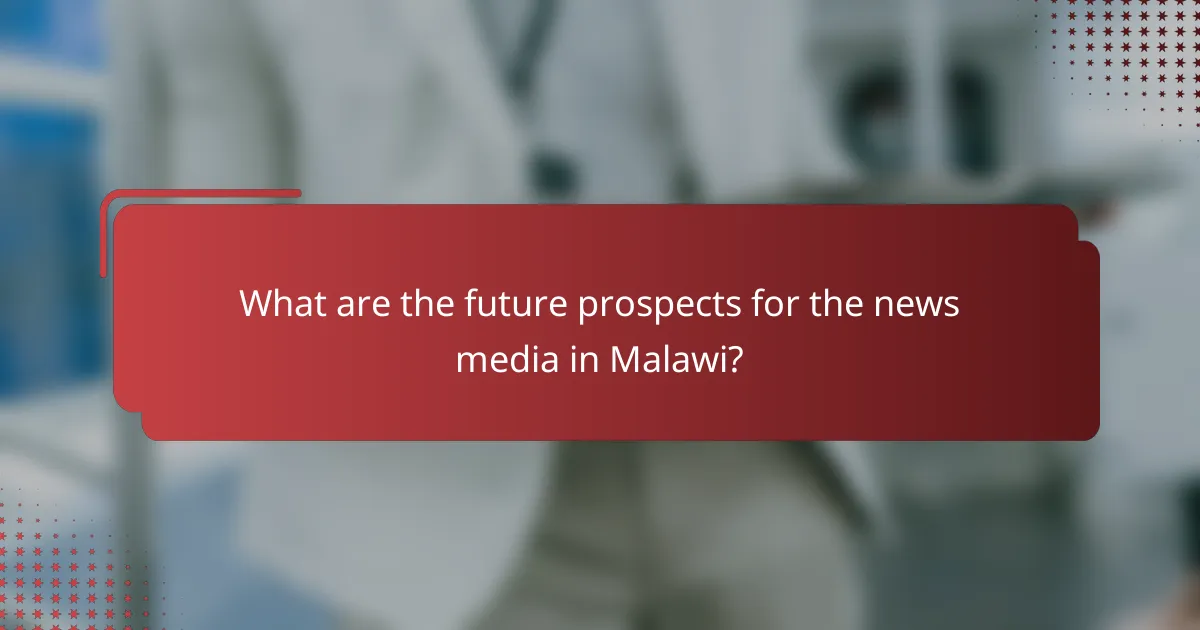
What are the future prospects for the news media in Malawi?
The future prospects for the news media in Malawi appear cautiously optimistic. Increased digital access is transforming media consumption. Mobile phone usage has surged, facilitating online news platforms. Government policies are evolving, aiming to enhance press freedom. However, challenges remain, including regulatory constraints and political pressures. The Malawi Communications Regulatory Authority continues to oversee media operations. Public demand for transparency is growing, pushing for accountability in journalism. International support for media development is on the rise, providing resources for training and infrastructure. Overall, the trajectory suggests potential growth, contingent on political stability and regulatory reforms.
How might upcoming elections affect media regulations and press freedom?
Upcoming elections may lead to stricter media regulations and potential threats to press freedom. Governments often implement tighter controls on media to influence public perception during election periods. This can manifest through increased censorship, restrictions on reporting, or targeted actions against journalists. Historical examples show that elections can lead to heightened scrutiny of media outlets. In Malawi, previous elections have seen government crackdowns on dissenting voices. Such measures may include legal actions against journalists or media houses that report unfavorably on the government. Consequently, the overall environment for press freedom may deteriorate, impacting the public’s access to diverse viewpoints.
What trends are emerging in the media landscape in Malawi?
Emerging trends in the media landscape in Malawi include increased digital media consumption and the rise of social media platforms. Traditional media outlets are facing challenges due to the shift towards online news. Mobile phone usage has surged, facilitating access to news via apps and social networks. The government has implemented regulations that impact press freedom, leading to a cautious approach among journalists. There is also a growing demand for independent media voices amid calls for transparency. Additionally, community radio stations are gaining popularity, serving local needs effectively. These trends reflect a dynamic shift influenced by technology and regulatory frameworks.
How can journalists adapt to changing government policies?
Journalists can adapt to changing government policies by staying informed and flexible. They should regularly monitor official announcements and policy changes. Engaging with experts can provide insights into the implications of new regulations. Building a network with other journalists fosters collaboration and information sharing. Training in legal aspects of journalism enhances understanding of compliance. Utilizing digital tools can streamline research and reporting processes. Historical examples show that adaptability leads to sustained journalistic integrity. For instance, during policy shifts in Malawi, journalists who quickly adjusted their reporting strategies maintained audience trust.
What best practices can be adopted to enhance media resilience in Malawi?
Enhancing media resilience in Malawi requires a multifaceted approach. Strengthening legal frameworks is crucial to protect press freedom. This includes enacting laws that safeguard journalists from harassment. Training programs for journalists can improve reporting skills and ethical standards. Establishing community media initiatives fosters local engagement and representation. Collaborating with international organizations can provide resources and support. Promoting digital literacy helps the public critically assess media content. Developing emergency response plans ensures continuity during crises. These practices collectively contribute to a more resilient media landscape in Malawi.
What strategies can journalists employ to navigate regulatory challenges?
Journalists can employ several strategies to navigate regulatory challenges. They should stay informed about current laws and regulations affecting media operations. Regular training on legal standards can enhance compliance. Building strong relationships with regulatory bodies can facilitate better communication. Journalists can also advocate for press freedom through public campaigns. Collaborating with legal experts can provide guidance on complex issues. Utilizing digital platforms can help circumvent restrictive regulations. Lastly, documenting and reporting regulatory abuses can raise public awareness and prompt reform.
How can the public support a free and independent press in Malawi?
The public can support a free and independent press in Malawi by actively engaging with and consuming local media. This includes subscribing to newspapers, watching local news broadcasts, and sharing credible news articles on social media. Financial support through donations to independent media organizations is also crucial. Public advocacy for press freedom can influence government policies. Participating in campaigns that promote media rights raises awareness. Attending community forums on press freedom can foster dialogue. Supporting journalists facing harassment is essential for their safety. Educating others about the importance of a free press strengthens public resolve. These actions collectively empower the media landscape in Malawi.
The main entity of the article is the news media in Malawi, specifically focusing on the impact of government policies on its operations and freedom. The article examines key regulations such as the Access to Information Act, the Communications Act, and the Media and Communications Policy, which shape the landscape of journalism by influencing media freedom, content regulation, and access to information. It also addresses the current state of press freedom, the challenges faced by journalists, and the role of public response in shaping media policies. Additionally, the article discusses international standards and agreements that affect local media regulations and explores future prospects for the news media in Malawi amidst evolving digital trends and upcoming elections.
